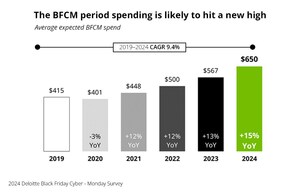The Great Recession Transforms Talent Management, Leadership and Development: Deloitte Survey Series
Deloitte Identifies Guideposts to Consider in Confronting the Talent Challenges of the New and Reset Economy
NEW YORK, April 19 /PRNewswire/ -- As the recession intersects with the recovery, Deloitte today announced a new report about talent trends in the changing economy based on a full year of in-depth research. In this latest report, "Has the great recession changed the talent game? Six guideposts to managing talent out of a turbulent economy," Deloitte captures ways surveyed executives and talent managers have adjusted their workforce and talent strategies to deal with the shifting economic forces from the depths of the recession to the first hints of the recovery. Further, Deloitte identifies six key guideposts for executives to consider as they map out their talent strategies to address the challenges of the changing economy.
"Based on our research, many executives are planning to use their pre-recession playbooks to manage their talent programs," said Jeff Schwartz, principal, Deloitte Consulting LLP. "However, relying on old methods to address entirely new talent challenges may prove detrimental in today's global economy that is desperate for innovation, refreshed leadership programs, and new demographic and skill gap challenges."
Since January 2009, Deloitte has been conducting a longitudinal survey to gauge how senior executives and talent managers are positioning their workforces, both in deep recession and emerging recovery. In this report, the last in the series, Deloitte presents the following key research findings and corresponding guidance for senior executives and talent manager to consider as the recession morphs in to the recovery:
1. The problem may look familiar, but the solutions are not
- Only 39 percent of executives surveyed have a talent plan aimed at driving innovation.
- Two out of three executives surveyed acknowledge that workforce planning is not being integrated at both the corporate and business unit levels.
- While the recession may have put retention planning on hold, 20 percent of executives surveyed acknowledge their companies have not updated their retention plans to take into account a changing economy.
2. There is a paradox of scarcity amidst plenty
- Among the executives surveyed in part three of the research series, 65 percent expressed concern about losing high potential employees and critical talent to competitors in the year following the recession.
- Nearly half (46 percent) of those surveyed recall that voluntary turnover increased following the 2001-2002 recession. Nevertheless, only 35 percent have an updated retention plan in place to keep hold of talent as the recovery strengthens.
3. Companies using the recession as their retention strategy are taking a big risk
- Among employees surveyed, nearly one-in-three (30 percent) are actively working the job market and nearly half (49 percent) are at least considering leaving their current jobs.
- Only 37 percent of Generation X and 44 percent of Generation Y employees surveyed plan to remain with their current employers.
- More than three out of four surveyed employees (76 percent) who intend to leave their current jobs cited lower morale at their companies.
4. Understanding your people is as critical as understanding your customers
- In ranking the top three retention tactics, in every instance, employees surveyed chose different and non-financial incentives compared to executives.
- While 62 percent of surveyed employees cited a lack of communication from executives during the recession only 35 percent of surveyed executives felt the need to increase the frequency of employee communication.
5. Show me the money — but show me the love, too!
- Among reasons for leaving current employers, surveyed employees ranked two non-financial factors among the top three: job security (36 percent), lack of career progress (27 percent) and lack of compensation increases (27 percent).
- More than one-third of surveyed employees (34 percent) reported that new opportunities in the market could prompt them to leave their current job, closely followed by a lack of compensation increases (33 percent) and a lack of career progress (24 percent).
6. Follow the market leaders
- Companies surveyed that described their leadership programs as "world class" are constantly searching the market for the best talent available, with 69 percent reporting plans to step up recruitment of critical talent.
- Companies surveyed that lead the pack on leadership are experiencing higher morale: 59 percent report an increase in morale compared to 21 percent at competing firms. Trust and confidence in corporate leadership is also rising faster 53 percent to 21 percent.
Methodology
Throughout 2009, Deloitte and Forbes Insights conducted Managing Talent in a Turbulent Economy, a five-part longitudinal survey of high-ranking executives worldwide. The series collected over 1,600 survey responses from top executives and talent managers and more than 350 employees, representing a cross-section of industries and the world's major economic regions.
A copy of this report series and Deloitte's latest information about talent strategies and innovative talent and work solutions are available via Deloitte's Talent Management website.
About Deloitte
As used in this document, "Deloitte" means Deloitte Consulting LLP and Deloitte Services LP, which are separate subsidiaries of Deloitte LLP. Please see www.deloitte.com/about for a detailed description of the legal structure of Deloitte LLP and its subsidiaries.
SOURCE Deloitte
WANT YOUR COMPANY'S NEWS FEATURED ON PRNEWSWIRE.COM?
Newsrooms &
Influencers
Digital Media
Outlets
Journalists
Opted In






Share this article